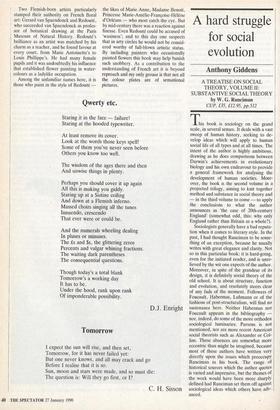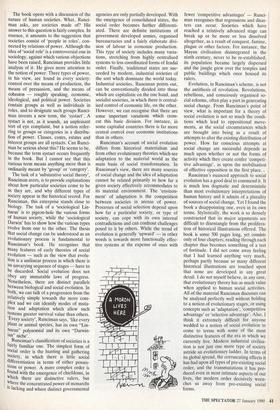A hard struggle for social evolution
Anthony Giddens
A TREATISE ON SOCIAL THEORY, VOLUME II: SUBSTANTIVE SOCIAL THEORY by W. G. Runciman CUP, £35, £12.95, pp.512 This book is sociology on the grand scale, in several senses. It deals with a vast sweep of human history, seeking to de- velop ideas which will apply to human social life of all types and at all times. The intent of the author is highly ambitious, drawing as he does comparisons between Darwin's achievements in evolutionary biology and his own endeavour to provide a general framework for analysing the development of human societies. More- over, the book is the second volume in a projected trilogy, aiming to knit together method and substance in social theory and — in the third volume to come — to apply the conclusions to what the author announces as 'the case of 20th-century England' (somewhat odd, this: why only England rather than Britain as a whole?).
Sociologists generally have a bad reputa- tion when it comes to literary style. In the past, I had thought Runciman to be some- thing of an exception, because he usually writes with great elegance and clarity. Not so in this particular book: it is hard-going, even for the initiated reader, and is unre- lieved by the wit one expects of the author. Moreover, in spite of the grandeur of its design, it is definitely social theory of the old school. It is about structure, function and evolution, and resolutely steers clear of any fads of the moment. Followers of Foucault, Habermas, Luhmann or of the fashions of post-structuralism, will find no sustenance here. Neither Habermas nor Foucault appears in the bibliography — nor, indeed, do some of the more orthodox sociological luminaries: Parsons is not mentioned, nor are more recent American social theorists such as Alexander or Col- lins. These absences are somewhat more eccentric than might be imagined, because most of these authors have written very directly upon the issues which preoccupy Runciman in his book. The range of historical sources which the author quotes is varied and impressive, but the themes of the work would have been more sharply defined had Runciman set them off against sociological ideas which others have adv- anced.
The book opens with a discussion of the nature of human societies. What, Runci- man asks, are societies made of? His answer to this question is fairly complex. In essence, it amounts to the suggestion that societies consist of 'people in roles', con- nected by relations of power. Although the idea of 'social role' is a controversial one in sociology, against which various objections have been raised, Runciman provides little analysis of it. He gives more attention to the notion of power. Three types of power, in his view, are found in every society: control over the means of production, the means of persuasion, and the means of cohesion — roughly speaking, economic, ideological, and political power. Societies contain groups as well as individuals in roles, and to designate such groups Runci- man invents a new term, the `systact'. A systact is not, as it sounds, an unpleasant sort of eye complaint, but a notion refer- ring to groups or categories in a distribu- tion of power. Classes, castes, estates and interest groups are all systacts. Can Runci- man be serious about this? He seems to be, because the term systact occurs frequently in the book. But I cannot see that this curious term means anything more than is ordinarily meant by 'group' or 'category'.
The task of a 'substantive social theory', Runciman avers, is to provide explanations about how particular societies come to be as they are, and why different types of society appear in the historical record. For Runciman, this enterprise stands close to biology. The task of a 'sociological Lin- naeus' is to pigeon-hole the various forms of human society, while the 'sociological Darwin' has to show how the various types evolve from one to the other. The thesis that social change can be understood as an evolutionary process is fundamental to Runciman's book. He recognises that many features of early theories of social evolution — such as the view that evolu- tion is a unilinear process in which there is an unvarying sequence of stages — have to be discarded. Social evolution does not obey any immutable laws of progress. Nonetheless, there are distinct parallels between biological and social evolution. In both, we can talk of a progression from the relatively simple towards the more com- plex and we can identify modes of muta- tion and adaptation which allow such Systems greater survival value than others, Every society', Runciman says, 'like every Plant or animal species, has its own "Lin- n. aean" polynomial and its own "Darwin- ian" niche'.
Runciman's classification of societies is a fairly familiar one, The simplest form of social order is the hunting and gathering society, in which there is little social differentiation in terms of either posses- sions or power. A more complex order is found with the emergence of chiefdoms, in which there are distinctive rulers, but !There the concentrated power of monarchs is lacking and where distinct governmental agencies are only partially developed. With the emergence of consolidated states, the social order becomes further differenti- ated. There are definite institutions of government developed armies, organised bureaucracies and a fairly elaborate divi- sion of labour in economic production. This type of society includes many varia- tions, stretching from highly centralised systems to less coordinated forms of feudal order. Finally, traditional states are suc- ceeded by modern, industrial societies of the sort which dominate the world today. Industrial societies, Runciman points out, can be conventionally divided into those which are capitalistic on the one hand, and socialist societies, in which there is central- ised control of economic life, on the other. However, we can recognise that there are some important variations which cross- cut this basic division. For instance, in some capitalist countries there is far more central control over economic institutions than in others.
Runciman's account of social evolution differs from historical materialism and from other evolutionary theories which see adaptation to the material world as the main basis of social transformation. In Runciman's view, there are many sources of social change and the idea of adaptation cannot be related primarily to how far a given society effectively accommodates to its material environment. The 'environ- ment' of adaptation is the competition between societies in arenas of power. Processes of social selection depend upon how far a particular society, or type of society, can cope with its own internal contradictions and can confront challenges posed to it by others. While the trend of evolution is generally 'upward' — in other words is towards more functionally effec- tive systems at the expense of ones with fewer 'competitive advantages' — Runci- man recognises that regressions and disas- ters can occur. Societies which have reached a relatively advanced stage can break up or be more or less dissolved altogether, as a result of conquest, famine, plague or other factors. For instance, the Mayan civilisation disintegrated in the ninth century, never to be re-established; its population became largely dispersed and the jungle grew over the temples and public buildings which once housed its rulers.
Evolution, in Runciman's scheme, is not the antithesis of revolution. Revolutions, rebellions, and consciously organised so- cial reforms, often play a part in generating social change. From Runciman's point of view, what is important for a theory of social evolution is not so much the condi- tions which lead to oppositional move- ments, as the social circumstances which are brought into being as a result of attempts to alter the existing distribution of power. How far conscious attempts at social change are successful depends as much upon whether or not the forms of activity which they create confer 'competi- tive advantage', as upon the mobilisation of effective opposition in the first place. .
Runciman's nuanced approach to social evolution has a good deal to commend it. It is much less dogmatic and deterministic than most evolutionary interpretations of human history and it admits of a plurality of sources of social change. Yet I found the book a disappointing one, even in its own terms. Stylistically, the work is so densely constructed that its major arguments are difficult to disentangle from the prolifera- tion of historical illustrations offered. The book is some 500 pages long, yet consists only of four chapters; reading through each chapter thus becomes something of a test of fortitude. I did not come away feeling that I had learned anything very much, perhaps partly because so many different historical illustrations are touched upon that none are developed in any great detail. I do not myself believe, in any case, that evolutionary theory has as much value when applied to human social activities. All of the material Runciman discusses can be analysed perfectly well without holding to a notion of evolutionary stages, or using concepts such as 'adaptation', 'competitive advantage' or 'selective advantage'. Also, I think it extremely difficult for anyone wedded to a notion of social evolution to come to terms with some of the most distinctive features of the era in which we currently live. Modern industrial civilisa- tion is not just one more type of society astride an evolutionary ladder. In terms of its global spread, the corruscating effects it has had upon all types of pre-existing social order, and the transmutations it has pro- duced even in most intimate aspects of our lives, the modern order decisively wren- ches us away from pre-existing social forms.



























































 Previous page
Previous page